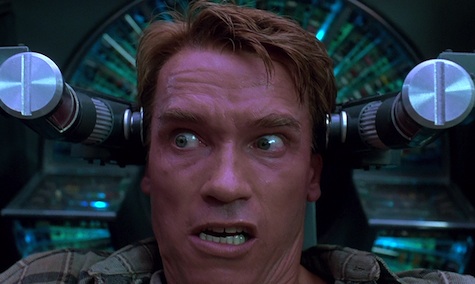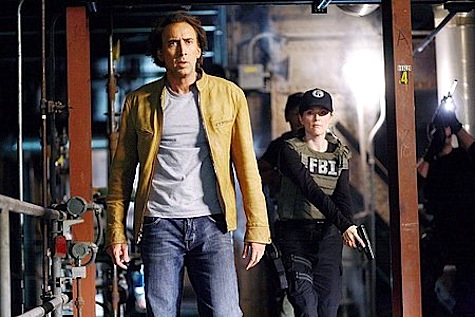Friday will see the release of a new Total Recall, which aims to erase our memories of another movie called Total Recall. Do films remember other films wholesale? Or do films dream of electric films? In either case, it remains to be seen if Total Recall is a cinematic imposter of a Philip K. Dick story or is instead just the second variety of a well-worn 90’s action movie.
In the meantime, join me as I turn my scanner, darkly, toward all of the films made from Philip K. Dick’s work and try to figure out which of them are quality movies and which actually have something in common with the source material. I’ll give each movie two letter grades: one for being a good or bad movie and one for being faithful to the source material. (Note: faithful doesn’t always mean just following the plot, but capturing the themes and essence as well.)
Blade Runner based on the novel Do Androids Dream of Electric Sheep?
Movie Grade: A+
Faithfulness to Source Material: D+
The most famous Philip K. Dick adaptation is also widely considered to be the one of the best science fiction films ever made. Talking about why this movie is so damn awesome isn’t what this is all about right now, but let’s just say that it deserves all the praise it gets—but the movie and the novel are extremely different. In the original text, the replicants are called “andys,” or servant androids. Richard Deckard is married and wants to own a real, live sheep (an ewe, to be exact). Owning real animals is a huge status symbol in the novel, a notion that barely surfaces in the film. Further, Deckard himself isn’t the depressed noir gumshoe we see in the film. He’s actually trying to better himself and move up the career ladder at his job. That’s a far cry from Harrison Ford being called back to duty in the film.
If a huge fan of SF and Philip K. Dick had somehow never read Do Androids Dream of Electric Sheep? and had never seen Blade Runner, I might blasphemously suggest they could skip the novel and just watch the movie. There are a lot of other Dick novels and stories, which are actually more cohesive and much better.
Screamers, based on the short story “Second Variety“

Movie Grade: D
Faithfulness to Source Material: C
Allegedly, Screamers has a cult following, though I’m not really sure why. The writer of the screenplay is a guy named Dan O’Bannon who is responsible for penning a host of other SF films including Dark Star, Alien, Lifeforce, Alien vs. Predator and notably, for adapting another Dick story, Total Recall. It’s not that Screamers is bad per se, it’s just that I don’t understand why anyone would like it. It’s also not really about what the story is about. Sure, the same basic premise of non-humans among us (“screamers”) is dealt with in a post- apocalyptic setting. However, the story takes place in what used to be France while this movie takes place on another planet. As with Imposter later, there’s only so many different ways to do robot paranoia in a movie without the concept getting stale. Movies like Imposter and Screamers don’t do a lot for Dick’s central thematic questioning of our own humanity through non-humans. It’s almost as though the re-imagined Battlestar Galactica understood PKD better than some actual Dick movies.
Total Recall, based on the short story “We Can Remember It For You Wholesale“

Movie Grade: B-
Faithfulness to Source Material: B
No one is rushing to give director Paul Verhoeven any medals for artsy subtlety. From Robocop, to Starship Troopers, to Showgirls, the name of the game is sex or violence and preferably both. We could think of Paul Verhoeven as the X-Rated Michael Bay, but that would be paying Michael Bay a compliment. As with his other movies, there is something to Total Recall. Is it a big dumb sci-fi action movie? Yes. Do you feel terrible watching it? No. As far as the source material goes, the biggest problem here is that in the short story Quail/Quaid never actually goes to Mars, but instead wants the memory of visiting Mars implanted in his mind. The story focuses more on the problem of trying to implant a false memory, but then that memory turns out to be real. It also serves up a nice twist which is lacking from the film. But Total Recall is in no way offensive to the short story. Instead, it’s exactly what it should be: “We Can Remember It For You Wholesale” + more guns and sex.
Confessions d‘un Barjo, based on the novel Confessions of a Crap Artist
Movie Grade: C-
Faithfulness to Source Material: C+
Imagine Philip K. Dick reinventing himself as a kind of mash-up between Charles Bukowski and John Updike: this novel would be the result. A literary non-science fiction novel, Confessions of a Crap Artist depicts the woes of suburban living. The action, such as it is, takes place primarily in San Diego in the novel, but in the movie it’s transported to France! Neither the film nor the novel are particularly memorable, but naturally the changing of the culture and the setting from the novel does alter what the source material is all about.
Imposter, based on the short story “Imposter“

Movie Grade: C
Faithfulness to Source Material: B
Both the story and the film suffer from the same problem: Philip K. Dick did better things with these same ideas and themes in other places. The notion that a man who is accused of being a replicant (and who is indeed a replicant and therefore a tragic figure) is explored better in Do Androids Dream of Electric Sheep? and elsewhere. Further, the film Blade Runner more subtly teases robot-or-not-robot dilemmas whereas the ham-handed Imposter makes all of its themes as obvious and predictable as its plot.
But it’s not all bad. Gary Sinise is pretty great in this movie, and it’s exciting enough to watch at times. Most interestingly, though, is that it’s not super inaccurate when it comes to the short story. In a lot of ways, it’s pretty much the same story. Certainly, in comparison with other Philip K. Dick adaptions, Imposter, in terms of faithfulness, can elicit a somber “close enough.”
Minority Report, based on the short story “The Minority Report“

Movie Grade: A
Faithfulness to Source Material: C
One of Spielberg’s more robust movies, everything about Minority Report moves, is exciting and relies on its science fictional aspects to push the story forward. It also has pretty much nothing in common with the short story. John Anderton in the film is an in-shape Tom Cruise with six pack abs. But in the story, he’s overweight and a little older. As in Do Androids Dream of Electric Sheep? the main character in Dick’s original version is married, but single/divorced in the movie.
The list goes on and on. Anderton of the film shuts down PreCrime; in the story, he prevents his closure. The origins of the Precogs are different (and much harsher in the story!) and the nature of the conspiracy around Anderton has totally different motivations. Unlike Do Androids Dream of Electric of Electric Sheep? vs. Blade Runner, however, the spirit of this movie feels like it’s in the same family as the short story.
Paycheck, based on the short story “Paycheck“
Movie Grade: D-
Faithfulness to Source Material: D-
Elegance is the main strength of this famous Dick story. After doing a job, which requires his memory to be wiped after the job’s completion, a man named Jennings finds himself on the run from the secret police. His promised paycheck isn’t there; he finds that he supposedly chose a bag of random stuff in payment, instead. The bag of random stuff of course proves to be really handy, and Jennings later realizes that there is a time-traveling version of himself helping him out. In contrast, the film is overly complicated, relies to heavily on action, and is just plain awful. It’s a bad movie based on an awesome story and you shouldn’t waste any amount of your paycheck on it. (I’m sure this joke was made a lot in 2003 when the movie came out.) Notably, John Woo has not made an American film since this movie released.
A Scanner Darkly, based on the novel A Scanner Darkly

Movie Grade: A-
Faithfulness to Source Material: B+
Despite what you may have heard, I find the Richard Linklater film to be a fantastic interpretation of this particular Dick novel. The rotoscoping-animated style of this film seems like it would also be perfectly suited to the surreal musings of Dick’s non-fiction (particulary his Exegesis, should there be a future adaptation). In this case, both the film and novel are science fiction stories about real drug addiction. I find both to be highly compelling, and the competence of the performances and the style of the movie make up for changes made from the source material. This is the “arty” Philip K. Dick movie and it’s totally watchable and fantastic. Also, Robert Downey, Jr., Woody Harrelson and Winona Ryder are all at their best in this moive. Possibly the best adaptation of Dick’s work, if not the best overall movie.
Next, based on the novelette “The Golden Man“

Movie Grade: D
Faithfulness to Source Material: F
I tend toward an unabashed, knee-jerk defense of bad movies with Nicolas Cage in the leading role, but this one can’t possibly be defended. A classic early Philip K. Dick story is completely gutted by a terrible mish-mash of a movie that was apparently made worse in rewrite hell. The story deals with a mutant named Cris who can see the future. He’s got golden skin, hence “The Golden Man.” In the movie he’s just Nicolas Cage, which I guess is our current society’s equivalent of a mutant. Talking about the “plot” of Next is hardly worth anyone’s time, but the biggest problems lie with Cris actually helping the government and fighting terrorism. While there’s nothing wrong with helping the government to fight terrorists, it’s not something Philip K. Dick was writing about and to have his name on this one in particular is pretty awful.
The Adjustment Bureau, based on the short story “The Adjustment Team“
Movie Grade: B+
Faithfulness to Source Material: B-
Though time may end up being unkind to this movie, I have a soft spot for it. The production design tends toward a future-noir sensibility, which makes an audience member, perhaps unwittingly, think of Philip K. Dick. If Jonathan Lethem’s Gun, With Occasion Music were ever adapted into a movie, I see it looking something like this. The actors are all decent and plot (though wildly different from the story) moves along smoothly enough. Unlike a lot of other Dick film adaptions, the protagonists aren’t divorced loners, and instead the story revolves around love. Well, it’s all about love and fighting The Man. Philip K. Dick was all about fighting The Man, but didn’t tend to be overtly romantic. I don’t think this one misrepresents him by having a relationship so central to the plot. Plus the notion of this secret society controlling everything behind the scenes is classic conspiracy theory porn. Best of all, it makes you want to go read the short story.
Total Recall (remake), based on the short story “We Can Remember It For You Wholesale“
Well, we’ll find out on Friday! So far it looks like they’ve ditched going to Mars is favor of a complicated conspiracy sleeper-agent plot. It might be good-ish. It might be terrible. But this is the second time Jessica Biel is in a Philip K. Dick adapation (Next) making her the new official Philip K. Dick actor.
Ryan Britt is the staff writer for Tor.com.










